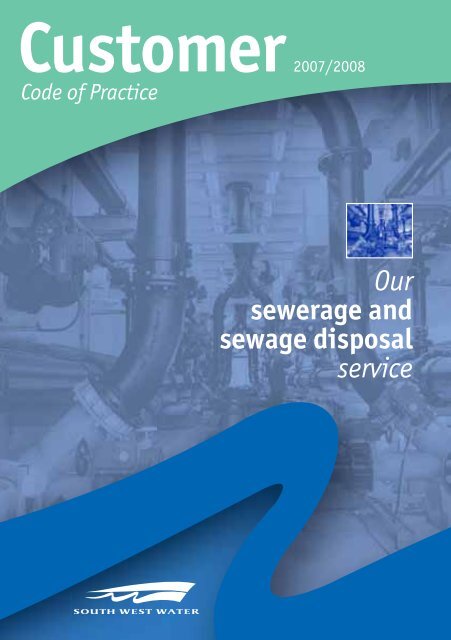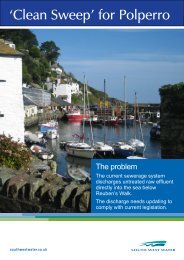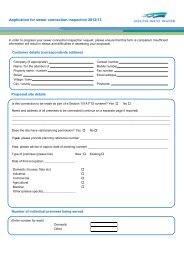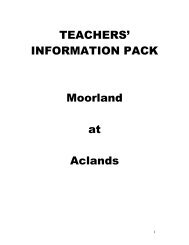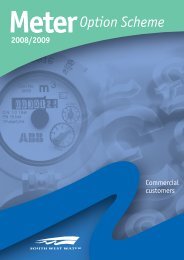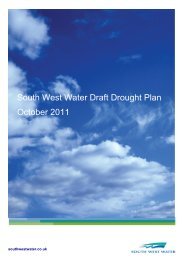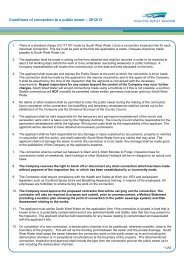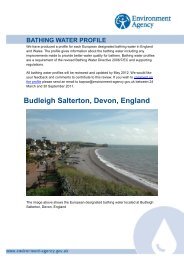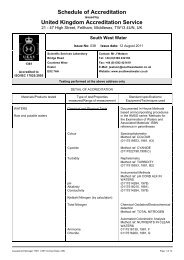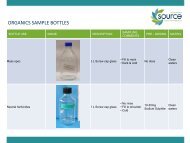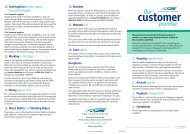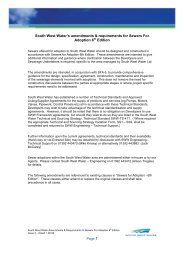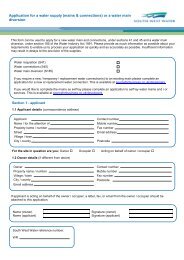Sewerage leaflet - South West Water
Sewerage leaflet - South West Water
Sewerage leaflet - South West Water
You also want an ePaper? Increase the reach of your titles
YUMPU automatically turns print PDFs into web optimized ePapers that Google loves.
Customer<br />
Code of Practice<br />
2007/2008<br />
Our<br />
sewerage and<br />
sewage disposal<br />
service
We maintain a network of public sewers which takes the waste<br />
water from your property for treatment and disposal and we are<br />
obliged to provide and maintain an adequate sewerage system for<br />
the region we operate in.<br />
Foul, surface water and combined sewers<br />
The sewerage system in your area is likely to be one of the following three types:<br />
■ A foul sewer takes only waste water, such as waste from kitchens and bathrooms<br />
for example.<br />
■ A surface water sewer takes only domestic rain water from roofs and some<br />
hardstanding areas (it may also take some highway drainage water).<br />
■ A combined sewer takes both waste water and surface water. This type of sewer<br />
was laid mainly before the 1960s and it tends to be more susceptible to flooding<br />
during heavy rainfall. Generally, we no longer accept new surface water<br />
connections to public combined sewers.<br />
■ Purpose Public sewers are specifically provided to convey foul drainage and in the<br />
case of surface water sewers and combined sewers, domestic surface water drainage.<br />
Our sewers are not intended to drain floodwater from rivers etc or run off from<br />
agricultural land or deal with highway drainage. The Highways Authority have their<br />
own responsibility for highway drainage even in locations where much of it is<br />
connected to one of our sewers.<br />
Responsibility for pipework<br />
The pipework which comprises the sewerage system can be categorised in three ways:<br />
a drain; a private sewer; or a public sewer.<br />
A drain is a pipe through which foul or surface water flows from one property to a<br />
sewer. Responsibility for the drain up to the point of connection with the sewer lies<br />
with the owner of the property. (Unless the pipe has been adopted as a Public Lateral<br />
drain by <strong>South</strong> <strong>West</strong> <strong>Water</strong>).<br />
2<br />
Services Helpline: 0800 169 1144
A private sewer is a pipe which collects and conveys foul or surface water from several<br />
properties. A private sewer may connect to a public sewer or a private sewage<br />
treatment works. Responsibility for a private sewer lies jointly with the owners of the<br />
properties which it serves.<br />
A public sewer is one we are responsible for and is shown as such on the statutory<br />
sewer map (please see page 4). We are responsible for public sewers.<br />
In most cases our sewers are situated in roads or public open places. In certain<br />
circumstances, however, our sewers may run through private gardens, in which case<br />
we have a right of access for maintenance and legal protection against you building<br />
over, or near, our sewer. Where we need to lay or maintain pipes in your land we will<br />
observe a Code of Practice for working on private land. A copy of the ‘Code of Practice<br />
for Pipe-Laying’ is available free of charge by telephoning our Services Helpline. The<br />
<strong>Water</strong> Services Regulation Authority (Ofwat) has a duty to investigate complaints<br />
about the company’s exercise of works powers on private land, unless he considers<br />
that the company has not had an opportunity to do so. Please write to <strong>South</strong> <strong>West</strong><br />
<strong>Water</strong>, Customer Services, PO Box 4, EX2 7HS in the first instance.<br />
Protection against flooding<br />
from public sewers<br />
We aim to provide adequate capacity in our sewers to ensure homes are not<br />
flooded by water escaping from them. The weather will always create a flooding<br />
risk as it is not financially feasible to provide sewers of sufficient capacity to cope<br />
with extremely high levels of rainfall. Flooding from sewers can also occur for<br />
other reasons, including blockages.<br />
If there is a sewer blockage or a pumping station breakdown which threatens to flood<br />
domestic premises, we aim to have a representative on site as quickly as possible and<br />
to start work within four hours. If there is a problem with the public sewerage<br />
system, please call our Services Helpline.<br />
If you are affected by water escaping from a public sewer call our Services Helpline.<br />
We will help with any external clearing-up necessary as a result of flooding caused by<br />
water escaping from one of our sewers. If your property has been flooded internally,<br />
we can help you find a specialist contractor who will carry out the clean-up operation<br />
and liaise with your insurance company on your behalf.<br />
(for Minicom users only: 0800 169 9965) 3
If any damage has been caused, please contact your insurance company as soon as<br />
possible. We are not liable for any damage caused by sewer flooding unless we have<br />
been negligent and have helped cause the problem.<br />
If you are not insured or your insurers decline to help, please contact us. A statement<br />
regarding our policy on the Flooding of Residential Properties from Sewers appears<br />
later in this <strong>leaflet</strong>.<br />
If your home is flooded, you may be entitled to a refund of your sewerage charges<br />
under our Customer Promise. You may also be entitled to a partial refund of charges<br />
if your garden has been flooded (for details of the Scheme please see our booklet<br />
entitled ‘What to Expect’).<br />
Sewage treatment<br />
The sewage effluent which we discharge to inland or tidal waters must comply with<br />
statutory standards. The Environment Agency sets these standards and checks to<br />
ensure that we meet them. It records the results of its samples in a public register.<br />
All sludge from a sewage treatment works must be disposed of in accordance with<br />
statutory requirements and Government licences.<br />
We operate our sewage treatment works in accordance with good practice, but<br />
sewage inevitably smells. We try to reduce odours as much as possible but cannot<br />
guarantee to eliminate them altogether. If odours are causing you a problem, please<br />
call our Services Helpline 0800 169 1144.<br />
The statutory sewer maps<br />
It is our duty to produce a map showing the location of every public sewer or disposal<br />
main or lateral drain which we are responsible for or which we have agreed to adopt.<br />
You have the right to inspect this map. If you would like to examine the map, please call<br />
our Services Helpline and we will advise you where the relevant map can be inspected.<br />
If you wish us to provide you with information from the map rather than inspect it<br />
yourself, there may be a charge for this service (details of the charge in the current<br />
financial year are contained within our ‘Charges Scheme’).<br />
4<br />
Services Helpline: 0800 169 1144
Adoption of private sewers<br />
If your home is served by a private sewer, you can apply for us to adopt it so that we,<br />
rather than you, become responsible for its operation and maintenance. Generally,<br />
we will not adopt a private sewer unless it conforms with the standards to which we<br />
construct public sewers, or the persons responsible for the sewer are prepared to<br />
undertake any necessary work to bring the sewer up to standard at their own<br />
expense. You can appeal to the <strong>Water</strong> Services Regulation Authority (Ofwat) if you<br />
consider that we have refused to adopt a sewer unreasonably or have imposed<br />
unreasonable conditions (our customer booklet entitled ‘What to Expect’ contains<br />
more information about arbitration).<br />
If you are buying a property, insist that your solicitor asks whether the sewer serving<br />
it is adopted. If it is not, you may be responsible for its maintenance, repair or<br />
replacement and you will therefore want to check its condition.<br />
Connection of drains or<br />
private sewers to a public sewer<br />
If you live in an existing property and providing that there is not a specific planning<br />
condition which advises that you cannot connect to the sewer, you are entitled to<br />
have your drain or private sewer connected to our public sewers, subject to certain<br />
practical requirements. You will though have to pay our expenses involved in making<br />
the connection.<br />
You will need to supply us with details of the drain or private sewer to be connected<br />
and how the connection will be made. We will let you know within 21 days whether<br />
we can accept your proposals and what the costs will be. We can refuse permission if<br />
we consider that the mode of connection or the condition of the connecting pipe<br />
would prejudice the condition and operation of our sewers. If you disagree with our<br />
decision, the matter may be referred to the <strong>Water</strong> Services Regulation Authority<br />
(Ofwat) for determination (our customer booklet entitled ‘What to Expect’ contains<br />
more information about arbitration).<br />
Full details of the expected standards for sewer connections are available in our<br />
Application Form for Sewer Connections.<br />
(for Minicom users only: 0800 169 9965) 5
You will have to pay:<br />
■<br />
■<br />
A charge for our inspecting the work or undertaking it ourselves.<br />
A contribution to our costs of providing the overall sewerage system.<br />
This is known as an infrastructure charge.<br />
For further information on the sewerage infrastructure charge, please refer to<br />
Section 11 of our ‘Charges Scheme’. Copies are available free of charge from our<br />
Services Helpline.<br />
Once you have paid the charges you must give us 14 days notice of the day you, or<br />
your builder, propose to do the work so that we may inspect it to ensure that it meets<br />
our standards.<br />
If we opt to make the connection to the sewer ourselves, any dispute about the costs<br />
we charge for making the connection may be referred to the <strong>Water</strong> Services<br />
Regulation Authority (Ofwat) for determination (our customer booklet entitled ‘What<br />
to Expect’ contains more information about arbitration).<br />
Requisitioning and provision<br />
of public sewers<br />
If you live in an area which is not served by a public sewer, you cannot demand that<br />
we provide one at our expense. However, if you and your neighbours – or your local<br />
authority – asks for a sewer to be provided we will provide one, but you and the other<br />
applicants – or your local authority – will have to pay any difference between the<br />
income we receive from charges for the disposal of waste water to the sewer and our<br />
reasonable costs in providing the sewer in each of the following 12 years. We will<br />
also want some security from you before doing the work. For our part, we must<br />
provide the sewer within six months of your agreeing that we do so. Unless you agree<br />
to an extension of time, you may have a legal claim against us if we exceed the 6<br />
month period or the agreed extension and you sustain loss or damage as a result.<br />
Any dispute in respect of the amount we require you to pay; or the undertakings or<br />
assurances we expect you to give; or any extension to the period of six months within<br />
which we must provide a public sewer; or the locations at which private sewers or<br />
drains connect to the public sewer may be referred to arbitration. (Our customer<br />
booklet entitled ‘What to Expect’ contains more information about arbitration).<br />
6<br />
Services Helpline: 0800 169 1144
First time sewerage<br />
Under Section 101A of the <strong>Water</strong> Industry Act 1991, new public sewers can be<br />
required to be provided by <strong>South</strong> <strong>West</strong> <strong>Water</strong> to serve existing properties with private<br />
waste water disposal facilities.<br />
If a new sewer is provided, an individual householder would be responsible for<br />
payment of a sewerage infrastructure charge and sewer connection charge; installing<br />
and paying for a drain to connect her or his home to the new sewer; making safe any<br />
private disposal system no longer required; and paying sewerage charges to <strong>South</strong><br />
<strong>West</strong> <strong>Water</strong> once a connection has been made.<br />
If you or your neighbours have private sewage disposal facilities such as septic tanks,<br />
soakaways or cess pools and are experiencing problems, then you may wish to<br />
consider a connection to a public sewer.<br />
It is now possible to requisition a lateral drain as well as a new public sewer to<br />
connect with the public sewerage system. This work can be very costly to the<br />
requisitioner if, for example, a long lateral drain or sewer is needed. However, this<br />
method of providing an extension of the public sewerage system is still possible and<br />
may be the appropriate solution in some cases.<br />
The <strong>Water</strong> Industry Act 1991 (Section 101A) allows for new sewers to be provided at<br />
public expense by <strong>South</strong> <strong>West</strong> <strong>Water</strong> Limited. A number of conditions must be met<br />
though for this to apply.<br />
Who qualifies?<br />
The following criteria must be met before sewers can be considered for construction<br />
under Section 101A:<br />
■<br />
■<br />
■<br />
The properties to be served must have a requirement for a drain used for<br />
domestic sewerage purposes.<br />
Two or more properties must be experiencing amenity or environmental<br />
problems. Examples of problems are odour, flooding of land or property,<br />
pollution of watercourses.<br />
The problems are not caused by inadequate maintenance.<br />
(for Minicom users only: 0800 169 9965) 7
■<br />
Qualification must also satisfy economic criteria to ensure that a public sewer<br />
connection is an economically viable solution.<br />
It is also necessary that the most appropriate solution is to provide a public sewer,<br />
but this will be judged once the extent of the problem is known.<br />
Normally the problem will be a long-standing one. There will often have been<br />
correspondence with the Environment Agency or with the Environmental Health<br />
Department of your Local Authority. In the most serious cases, these bodies may be<br />
prepared to take action by issuing formal notices, or they may already have done so.<br />
How much does it cost?<br />
A householder connecting to the new sewerage system will be responsible for<br />
■ Payment of the standard Infrastructure Charge for the sewerage service.<br />
■ Payment of the standard Connection Charge.<br />
■ The cost of installing the drain to connect your property to the new sewer and<br />
making the connection.<br />
■ Making safe any private systems no longer required.<br />
Once the connections are completed, householders will be billed for the sewerage<br />
service in the normal way.<br />
What do I need to do and<br />
what then happens?<br />
If you think that you and your neighbours have a problem with your existing private<br />
sewerage system which could be resolved by the provision of sewerage facilities,<br />
then you may contact <strong>South</strong> <strong>West</strong> <strong>Water</strong> Limited, the Environment Agency or your<br />
local Environmental Health Officer as appropriate.<br />
In normal circumstances, the Environment Agency or the Local Authority will<br />
undertake some survey work to establish the extent of the problem to determine the<br />
details of the existing private systems if any, and whether adequate maintenance has<br />
been carried out.<br />
8<br />
Services Helpline: 0800 169 1144
Once this preliminary work is carried out, the company will prepare a preliminary<br />
design and put an approximate cost to the work. A decision will then be made on<br />
whether the scheme could be viable.<br />
It may be appropriate for a public meeting to be held to enable discussion of<br />
problems, possible solutions and any other issues.<br />
If, at this preliminary stage, a scheme appears to be viable, the company will then<br />
undertake detailed studies to establish with more confidence details of the design<br />
and its cost.<br />
Applications will then need to be completed by householders applying for the<br />
sewerage service to show that they accept the costs incurred. The scheme can then<br />
be constructed.<br />
What do I do if I am not satisfied?<br />
You may appeal to the Environment Agency for a determination.<br />
The Environment Agency will then notify you of its decision which is final. If public<br />
sewer works are not to be carried out, the Agency may make recommendations or<br />
give guidance on drainage matters, as appropriate.<br />
What else do I need to know?<br />
First Time <strong>Sewerage</strong> schemes are intended to help solve problems that are too costly<br />
for individual householders to fund by requisitioning sewers. However, public<br />
sewerage schemes are very costly, and will usually become viable with the fullest<br />
uptake of connections from all householders.<br />
(for Minicom users only: 0800 169 9965) 9
Statement of Practice<br />
regarding claims for compensation arising<br />
out of the flooding of residential properties<br />
from sewers<br />
We aim to provide adequate capacity in our sewers to ensure homes are not flooded<br />
by water escaping from them in normal wet weather conditions. Heavy rain will<br />
always create a risk of flooding, but, we are working hard to protect homes against<br />
flooding from sewers. Flooding from sewers can also occur for other reasons, the<br />
most common being a blockage in the system. Blockages can occur almost anywhere<br />
without warning and we will usually need to be contacted to clear them.<br />
If your home does flood because there has been so much rain that a sewer cannot<br />
cope with the amount of water entering it, or because there has been a blockage in a<br />
sewer, we are not liable in law for any damage unless we have been negligent and<br />
helped cause the problem. Customers should therefore insure their goods,<br />
belongings and property against damage arising from flooding.<br />
However, in the event of flooding from our sewers please contact us immediately on<br />
0800 169 1144 (Minicom 0800 169 9965) as we can assist with cleaning-up. Also<br />
where water has escaped from our sewer into your home, we will refund – or credit to<br />
your account if all charges have not been paid – an amount equal to the sewerage<br />
charges payable by you in the year in which the flooding occurs (subject to a<br />
maximum of £1,000 per customer per property). A payment will be made each time<br />
flooding occurs.<br />
Where water escaping from a sewer has flooded your garden only, and where we are<br />
notified at the time, we will make a payment, or credit to your account, an amount<br />
of up to 50% of your annual sewerage charges depending on the extent and nature<br />
of the flooding. A maximum of 50% of the annual charges will be paid in any one<br />
financial year.<br />
Unless rainfall has been exceptional, these payments will be made automatically<br />
provided that we are contacted at the time of the flooding.<br />
10<br />
Services Helpline: 0800 169 1144
If you suffer loss or damage as a result of flooding please contact your insurance<br />
company as soon as possible to make a claim.<br />
If you are not insured, or your insurance company will not fully meet your claim,<br />
please contact us. While we are not liable to reimburse you for any expenses you may<br />
incur as a result of flooding, it is our policy, wherever it is reasonable, that you<br />
should not face undue financial hardship because of flooding which has not occurred<br />
because of any fault of yours.<br />
Where you are asking us to meet an expense not covered by your insurers, our<br />
agreement to do so must be obtained before you spend any money. In nearly all<br />
cases, we will not agree to meet any claim after you have already spent the money.<br />
Where replacement cost is paid, the damaged goods will become the property of<br />
<strong>South</strong> <strong>West</strong> <strong>Water</strong>. .<br />
If you wish to submit a claim, please do so in writing to <strong>South</strong> <strong>West</strong> <strong>Water</strong>, Customer<br />
Services, PO Box 4, Exeter, EX2 7HS.<br />
Any payments which may be made to you will be made on an ex-gratia basis and will<br />
not be a legal admission of liability for any damage caused.<br />
(for Minicom users only: 0800 169 9965) 11
Printed on 100% recycled paper<br />
12<br />
<strong>South</strong> <strong>West</strong> <strong>Water</strong> Limited, Peninsula House<br />
Rydon Lane, Exeter EX2 7HR<br />
Registered in England No. 2366665<br />
www.southwestwater.co.uk<br />
70270 3/07


